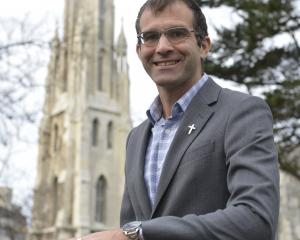
It's a curious social commentary that one of the big excitements about moving down from Level 4 to Level 3 was the possibility of takeaways.
Families and bubbles who had exhausted a set rotation of meals were keen for their delicacy of choice, be it Indian, Chinese, fish and chips, or some other mouth-watering culinary experience.
The task of home-cooking during the pandemic has provoked a range of responses from monotony, burden and boredom on one hand, to exploration, experimentation and the joy of shared time eating with others on the other. I suspect for many it has been a combination of all of the above. The pandemic has helped to draw our attention to something so central to human life but so often at the periphery of our attention: food.
In Cooked: A Natural History of Transformation, journalist Michael Pollan traces the fascinating progress of human cooking from the earliest days of hunting and gathering to the profound shifts in society caused by the seemingly innocent development of milling and processing white flour in the mid-20th century.
Pollan explores how the undeniable social progress of women, moving from the domestic sphere to paid employment, was accompanied and monetised by a developing industry of pre-made and fast food. Traditional ways of cooking were going the way of home pickling, crochet and darning socks.
What may have been commonplace in the 1950s, home-cooking every day, for every meal, makes its reappearance when the country moves into Level 4, when the convenience of someone else’s cooking is taken away. This reality should encourage us all to think more deeply about the origin of our kai, and its relationship to us and to the whenua.
Food is central to us as human beings because it affects us physiologically, socially, economically, politically and spiritually. The more you think about it, the more there is to it. There’s also something mysterious about it, too. Pollan notes that someone with an unlimited supply of flour could survive on it for about a month. Yet, if that same flour was baked into bread, they could survive pretty much indefinitely.
I wouldn’t want to go back to the 1950s, but I would like to have a go at pickling vegetables grown here, from this soil, to be enjoyed by and nourishing to people I care for. What does our food say about what our values are as a society? It’s worth a thought.
This past Sunday, many churches were able to meet for the first time since the Level 4 lockdown. Churches were equipped with contract tracing QR codes, registers and hand sanitiser. At St Martin’s Anglican Church in North East Valley, singing hymns and hospitality after the service were absent, but, crucially, that central meal of Christian thanksgiving, the Eucharist, was present.
Though the priest consumed wine on behalf of the congregation, those who were present were able to come up, socially distanced and sticky with hand sanitiser, to receive the bread that becomes to us the body of Christ.
Ever since Jesus told his followers to ‘‘Do this in remembrance of me’’ (Luke 22:19), Christians have been celebrating the gift and mystery of this sacrament. A sacrament is an outward sign of an invisible reality. For Christians, the Lord’s Table is a sacrament in which Jesus’ body is offered as a gift, as something to be received bodily as food.
Christians have been obeying the Lord’s command for 2000 years, plenty of time for past generations to bequeath a wealth of tradition to those of us alive today.
Though we live in a time of incredible social change, some traditions are worth keeping (whether this includes darning socks, I’m not sure!). Some traditions bring us life and connect us more deeply to one another.
The bread and wine of the Eucharist is one of these traditions and deserves its place at the centre of Christian worship. Everyone is welcome at the Lord’s Table. This is meal to which everyone is invited.
Christians also believe that the Eucharist connects us, in some mysterious way, to God. As one offertory prayer goes, ‘‘Through your goodness we have this bread to offer, which earth has given and human hands have made. It will become for us the bread of life.’’
Our food is our life, so it’s worth remembering where it comes from, how it’s made, and the relationships we build when we eat together.
- Katie Marcar is a teaching fellow in biblical languages in the theology programme at the University of Otago and an ordinand in the Anglican Church.












